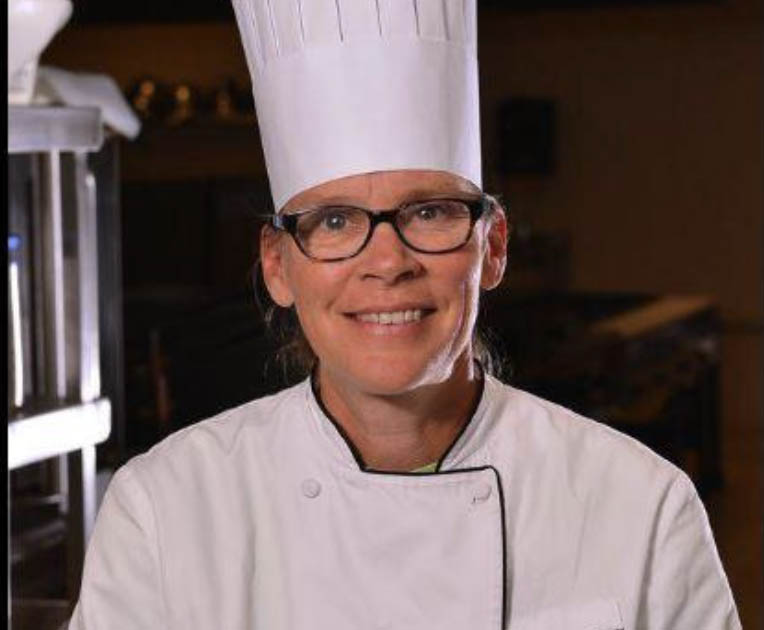Culinary Schools Adapt to COVID-19
July 28, 2020

Restaurants continue to contend with COVID, and universities plan reopening strategies for the fall, but for culinary schools, which combine both elements, the landscape is particularly challenging.
While program leaders across the state say enrollment is down, there is still a great need for hospitality education, but, like everything else, it will look a little different in a COVID-19 world.
In South Carolina, culinary schools changed quickly to add online and virtual elements to its classes, and they have spent the past few months honing and reframing everything from how they teach new health and safety protocol to how they prepare students for a culinary world that will likely require equal ability to create a perfectly plated dish and a meal that holds up to delivery.
Amy Byers, program coordinator for the culinary department at Spartanburg Community College, said students this fall will be required to wear masks and stay six feet apart.
Class sizes will be smaller, and the hospitality marketing class she’ll be teaching will meet in a classroom setting just one day a week instead of two days as originally planned.
Further, the department has added equipment so that each student can have their own cooking station. And instead of buying ingredients on their own, Byers said instructors will purchase and measure the cooking materials for the students.
“We added a prep room onto our kitchen and spread students between two rooms,” she said.
In addition, instead of cooking meals in-house for faculty and staff each Thursday, the students will be studying menu options and preparing to-go orders for faculty, staff and students.
Meal kits may also be made available to students who could create their own meal at home.
Teaching Food 101 from a distance
Hospitality and food service have always had to pivot, that is the message Kristen Grissom is pushing with her students at the Culinary Institute of the Carolinas at Greenville Technical College.
Call it their first lesson.
In March, the Culinary Institute began doing a mix of virtual lectures and demonstrations. Students got kits with tools and ingredients needed for each lesson. They then had to document themselves performing each skill.
The coming semester will bring a mix of in-person and virtual instruction.
Class sizes have been reduced to better allow for social distancing in the kitchen and both staff and students are required to wear masks.
It’s good practice for how restaurants are operating now, Grissom said.
All schools we spoke to have taken similar steps in requiring masks and temperature checks, social distancing and in the culinary departments, usage of gloves.
At the Culinary Institute of Charleston at Trident Technical College, students already did a mix of online and in-person instruction, but there will be a permanent virtual option now for students who don’t feel comfortable coming into a space with other people.
And the program is using new technology to create a more seamless virtual platform that integrates high quality video content, PowerPoint lessons and assessments.
Faculty have spent the summer recording instructional videos that will act as a supplemental teaching tool for students now and at other times as well, said Department Head Michael Carmel.
Reframing curriculum
Culinary schools have always been focused on sanitation and food safety, but safety training includes more COVID-inspired lessons like the importance of masks and how to properly use gloves.
Some culinary programs, like the one at Bob Jones University, are also including lessons on how to safely and efficiently package a dish for takeout.
“We’re thinking through not only what we teach but how we teach,” said Robert Hansen, who oversees the culinary arts program at Bob Jones University.
Hansen is looking to update his Principles of Food Production class this semester.
“So, it’s here’s how we would normally serve this in a restaurant, and now do some research and find a to-go container that could make this look good so that we don’t forsake completely presentation,” Hansen said.
But the new measures offer a special learning opportunity, said Joseph Bonaparte, executive director of the International Culinary Institute of Myrtle Beach at Horry-Georgetown Technical College.
“The likelihood of our students in the next 20 to 30 years of their career are going to encounter something like this is good,” Bonaparte said. “That’s one of the good things coming out of this, if we are teaching our students to be more safe.”
Banquet and catering instruction will look different
“With buffets, we’re talking about them with caveats,” Grissom said. “Manned stations, with disposable utensils and requiring masks and gloves and hand sanitizers for guests coming through as well.”
Think about all the touch points that must be monitored.
One of the most important classes in any culinary program involves cooking as you would in a restaurant. This means students get “real world” experience in how to cook large volumes of food with attention to speed, quality and safety.
At the Culinary Institute of the Carolinas, students normally get practice running a restaurant service for the general public. With COVID, that has been shut down, but Grissom and her team have kept up the cooking while allowing members of Greenville Tech’s faculty and staff to come and pick up to go meals for their families.
“It’s the times and if you can change with them, you’re fine, but the ones that refuse to budge, times are gonna leave you behind,” Grissom said. “That’s true of any industry but hospitality has always been fickle that way; you kind of have to be on the edge.”